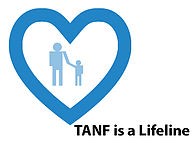All too often, the policy conversation surrounding TANF — the Temporary Assistance for Needy Families program that provides minimal cash assistance, job training and other services for struggling families — focuses on adults. But here in DC, there are more than 13,000 children from over 6,500 families who are poised to lose this critical safety net on October 1, 2016 due to existing time limits on the program.
Given this horizon, it’s an important time to step back and understand the population that TANF helps most in our community: kids in crisis.
Today, one in four DC children live in poverty — that’s about $24,000 a year for a family of four — and in our poorest neighborhoods east of the Anacostia River, th e figure is closer to one in two. The modest cash benefits that TANF provides — just $441 a month for the average family receiving TANF — are often the only reason a child may have food for dinner and heat in the winter.
e figure is closer to one in two. The modest cash benefits that TANF provides — just $441 a month for the average family receiving TANF — are often the only reason a child may have food for dinner and heat in the winter.
The evidence is clear: TANF works and protects kids from the harshest effects of poverty. Conversely, the experiences of families in other jurisdictions tell us that cuts in TANF benefits have resulted in increased hunger and poor health outcomes among children.[i] Additionally, children in families who have lost TANF support do worse in a number of developmental areas and score lower on tests of quantitative and reading skills, resulting in long-ranging effects on these children’s ability to finish school and find meaningful work as adults.[ii]
While the direct impact on a child’s future well-being can be devastating, what is equally alarming is the link shown between cuts to TANF and increased homelessness and involvement in the child abuse and neglect system. Studies in multiple states have shown that TANF cuts correspond to increased housing instability and increased contact with the child welfare system.[iii]
If we are to use other states as a guide, if the TANF cut-off takes effect without transitioning these families to jobs and other support, our child welfare system, homeless services and other human services functions must be prepared to absorb a significant increase in demand. Many of these families will face an increased risk of instability and others will immediately fall into crisis.
The bottom line: eliminating TANF payments to families is the wrong thing to do. It will hurt children and will strain our social safety net.
That is why the Children’s Law Center supports the District of Columbia Public Assistance Amendment Act of 2015. This legislation was co-introduced by six councilmembers and is strongly supported by the community. The bill:
- Continues benefits to parents and their children, who are passed the 60-month time limit, but face a severe disability, domestic violence, homelessness or other barriers that have gotten in the way of employment;
- Continues benefits after 60-months for families who are doing everything they can, following program requirements, but are still unable to find a job;
- Supports our poorest children in the TANF program, even if their parents cannot otherwise qualify, because children should always have their most basic needs met no matter what.
Forty-four other states offer time limit extensions to families whose circumstances have prevented them from finding employment that would allow them to successfully transition off of aid. Without these extensions, the District lags behind its peer jurisdictions, placing children at risk of premature and crisis-inducing cut-offs.
All too often, the Children’s Law Center sees the impact that poverty can have on our most vulnerable youth. We believe it’s time that the District steps up to provide the necessary safety net to prevent children from falling into crisis.
To print a copy of today’s blog, click here.
[i] The Impact of Welfare Sanctions on the Health of Infants and Toddlers, available at: http://www.childrenshealthwatch.org/upload/resource/welfare_7_02.pdf
[ii] Review of Research on TANF Sanctions, Report to Washington State WorkFirst SubCabinet, available at: http://www.docin.com/p-93913888.html.
[iii] Linda Burnam, Annals of the American Academy of Political and Social Science, Welfare Reform, Family Hardship, and Women of Color (2001). See, also, Sandra Butler, TANF Time Limits and Maine Families: Consequences of Withdrawing the Safety Net (2013), available at: http://www.mejp.org/sites/default/files/TANF-Study-SButler-Feb2013.pdf.
